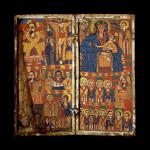This then be my prayer; but thou, O dear Timothy, by thy persistent commerce with the mystic visions, leave behind both sensible perceptions and intellectual efforts, and all objects of sense and intelligence, and all things not being and being, and be raised aloft unknowingly to the union, as far as attainable, with Him Who is above every essence and knowledge. For by the resistless and absolute ecstasy in all purity, from thyself and all, thou wilt be carried on high, to the superessential ray of the Divine darkness, when thou hast cast away all, and become free from all.
After beginning his work with a prayer, Dionysius addressed his audience, Timothy, indicating his wish for Timothy to be taken up into a transcendental union with God, indicating what Timothy should do in order to prepare himself for that union.
Who was this Timothy? Those who assumed this work was written by the Areopagite, assumed that he was the Apostle Timothy, the first bishop of Ephesus and co-worker with Sts. Paul and Silas. Yet, as our Dionysius was not the Areopagite, the recipient of the text could not have been that Timothy. While there might be a particular who was the first to receive his text, who might have been named Timothy, the universal application of the text suggests something else: Timothy is not just a person, but a symbol representing any and everyone who was deemed worthy of reading and following his advice. This person would be seen to be one who “honored God,” [1] taking the meaning of the name Timothy as a clue to the intended audience being more than just one person, but a category of person ready for a transcendental engagement with God. Those who match the qualities attributed to Timothy would therefore be represented by Timothy. From what Dionysius indicated, not only must they honor God with their lives, they must also have had some sort of commerce with the mystic visions, which is how and why they are led to open themselves up to God more and receive, in return, his superessential ray of the Divine darkness.
The Mystical Theology is not to be read as a work of theory, but rather, as a work which maps out the path to union with God, using actual experiences with God to motivate and guide the reader forward until they are raised aloft unknowingly to the union, as far as attainable, with Him Who is above every essence and knowledge. These visions are to be understood as only introductory, on the level of the senses, the imagination, or the intellect; they are for beginners, coming to know of God and to love him. We can experience God through the senses, such as in and through the use of icons, or through various forms of meditation which employ our imagination to reflect upon the truths of God, such as found in the Spiritual Exercises of St. Ignatius of Loyola, or we transcends these, and engage in a mental exercise which transcends the senses but remains wholly contained within our mind, and on each of these levels, we can have mystical visions or experiences which brings us into the presence of God, but we must remember the limitations implied in such an engagement with God. He empties himself for us to be able to be ascertained in a form which is less than his own glorious existence. As such, what we receive in these elementary forms of mystical contact with God is limited; it is true, but we must not confuse what we receive and comprehend is the fullness of God as he is, but rather, a derivative secondary presence of God which should make us desire to transcend those limitations and therefore engage God in a way beyond all objects of sense and intelligence, beyond our intellectual capability – beyond knowing, so that we be raised aloft unknowingly to the union, as far as attainable, with Him Who is above every essence and knowledge.
God is beyond the senses, indeed, beyond the comprehension of the human intellect. To encounter God in and through the senses, or through the human mind, will only provide a limited engagement with God. The danger is to confuse what we understand of God to be truly who and what God is, making us seek after and follow after the simulacrum of God contained in our own understanding rather than God himself. This simulacrum of God quickly becomes an idol which we worship instead of God, where, in the end, we worship the God of our own making (through our intellect, if not through our hands).[2] To keep ourselves from falling for such error, we must always keep in mind that whatever we comprehend is never going to be who or what God is, but merely a reflection of God, a derivative form which matches our intellectual capability. We should not confuse the absolute of God with the convention which we can establish for God, but on the other hand, we must not confuse the convention as being the same as being false. So long as we do not confuse the convention with the absolute, but rather a pointer by which the absolute can be represented, we will keep to the truth of the incomprehensible nature of God and therefore not stand idle before the idol derived from the representation of God contained in our understanding.
This is why in addressing Timothy, in addressing the one who seeks to honor God, Dionysius said that for the transcendental experience of God, we need to leave behind both sensible perceptions and intellectual efforts, and all objects of sense and intelligence. We must find a way to silence ourselves, first in our senses, closing them off, so that we no longer engage sensual objects, and then, with the mind no longer being seeded with sensual input, we need to silence the mind itself, cleanings it of all attempt to engage God with its imaginative and reasoning faculties, so that it puts forth nothing over the experience it is to have of God. This is not because we cannot find and experience God in and with our senses and mind, but because such an experience is limited, less than what we would find in a true union with God.
We can see God reflected in his creation; this is a good and wonderful thing, but God transcends that reflection. It is good to come to know God through his works, through what we discover of him in the sensual world. This is how most of us first come to know and realize God the existence of God. Moving beyond the senses, we will use our imagination and reason to try to understand God. This, too, is a good thing, but its good, even if it is greater than what can be had in the senses alone, remains less than optimal. Since God transcends what we know, if we want to truly experience God, we must move beyond our knowing and willingly go where our mind is silenced, where we no longer seek God in our knowing and what we comprehend. We must move out of our mind, out of ourselves, if we are to encounter God as he is in himself. He is above every essence and knowledge; every thought construction which seeks to create an essence for the things which we experience, every engagement of our discursive reasoning, will be like a veil which keeps God away from us.
We must silence ourselves, detach ourselves from all things, sensual and intellectual, so that we become ready to encounter God. We must not let anything come between us and our experience of God. Thus, our actions, even when they are relatively good, can become a fault if we become too attached to the fruit of our actions instead of seeking after God beyond them. We must purify ourselves, which of course, cannot be done without God’s help, without his grace, but likewise, it will not be done if we do not cooperate with that grace and allow it to purify us. Robert Grosseteste explained that what we need to do is remove from ourselves every attachment to things which are not God, including all things which we put over the experience of God through our senses or our mind by denying all that we perceive or think of God so that what we have left after such detachment is God himself:
You, I say, taking away everything (as has been said), and being attached to nothing, or taking away everything (that is, from the divine ray itself) through denying all things of him; being cut off, as was said, from all things, approach the vision of him.[3]
As long as we think and engage God in and only through our imaginative and rational faculties, we will be the cause of our own disengagement with God. Once we come to know and love God, our love will seek him, and in doing so, will be the foundation by which we seek to overcome ourselves so that we can be united with him. It is love which allows us to die to ourselves, to empty ourselves, to disengage the senses and silence the mind, so that we can enjoy a union with God, as Ficino explained:
Only love, however, can do this at some point – love whose proper virtue is equally to transport and unite, and through which it transports the rational soul from lower things to its summit, and then unites it to that summit. [4]
The rational mind, with discursive reason, divides and establishes for itself its representation of the created order, superimposing upon the things of creation the essences which it establishes for them. The mind does this in a dualistic fashion, with the central distinction in its duality being the difference between a falsely constructed notion of an independent self which it holds and believes itself to be with the rest of the great chain of being. Everything is established in relation to that self, seen in and through that self, making that self lord over all. Even the notion of existence and non-existence, which emerges from the mind, can be seen to be related to the notion of the self, for existence is seen in reflection of that self, and non-existence is seen in what comes in opposition to and denial of that self. As the distinction between existence and non-existence forms the basis by which we understood good and evil, with evil being related to non-existence and the privation of the good, the mind’s dualistic engagement with the world slowly establishes for itself the belief in a substantial non-being and with it, a substantial evil. Taking forth and consuming the fruit of the tree of good and evil can be seen as the transformation of the conventional representation of the world which the mind establishes as an absolute, overturning the absolute which is found in God by making the self absolute.[5]
The mind therefore can be seen as acting as a mini-creator, establishing not out of nothing, but of being, a divided landscape which then becomes the basis by which it acts with and upon the world. This is what we must overcome. Thus, the mind, in its silencing, will disengages such thought construction; it must deny all that it has affirmed so that in such denial it has nothing to hold to and place between it and God. This is why Dionysius said we must leave behind the dualistic distinction of not-being and being, because that distinction itself is a thought-construct which imputes falsehood over reality, and therefore, a falsehood which is put in place between the mind and God. Because the senses seed into the mind all kinds of input which it uses to establish its thoughts, the senses are to be silenced, so that the thoughts which come out of those sensations can be stopped. Likewise, what can be and is established in the imagination must also be silenced, for such imagination can and will be used to seed similar thought constructs which reify the dualistic distinction which must be overturned. By taking away the senses and the imagination, the input which feeds the intellectual activities and its thought-construction will be stopped, so that the mind will find it easier to engage the silence it needs in order to rest properly in God. This is the process which we go through to engage true prayer with God because all that we have put between ourselves and God will vanish. In this prayer, it is said, we will not even know ourselves, because the concept of the self and its reification will no longer be had in our mind during our encounter with God. If we are thinking of ourselves, we will find that thought is enough to get in the way of God and to silence him, but if we silence our selves and all thought of our self, then there will be nothing left to separate us from God and all that we will have will be in God and of God. This is why Dionysius said that every concept, every aspect of knowledge, including but especially, that of the self, is to be overcome so that we can be raised aloft unknowingly to the union.
We come from and participate in existence in and through God. We must realize this not only in theory, but in actuality. When we have driven out of our mind any and all reified notions of the self which will keep us centered in upon ourselves instead of God, then we will experience the rapture of absolute ecstasy.[6] We will find ourselves carried on high, to the superessential ray of the Divine darkness, enjoying the glory of God which is found in both his self-revealing light of truth but also in his obscure, hidden, transcendent nature which is said to be dark because it remains beyond our comprehension.
[Image= Double slit x-ray simulation by Timm Weitkamp (Own work) [CC BY 3.0 de (http://creativecommons.org/licenses/by/3.0/de/deed.en)], via Wikimedia Commons]
[1] The name Timothy, Τιμόθεος (Timotheos), comes from the Greek words τιμή (timé) meaning honor and Θεός (theós), meaning God. Timothy, therefore, is someone who honors God.
[2] Feuerbach is justified in his criticism of such a God and so can be a useful critic to engage until that idol is overthrown.
[3] Robert Grosseteste, “De Mystica Theologia” in Mystical Theology: The Glosses of Thomas Gallus and the Commentary of Robert Grosseteste on De Mystica Theologia. Trans. and ed. By James McEvoy (Parish: Peeters, 2003), 71.
[4] Marsilio Ficino, Mystical Theology in Marsilio Ficino: On Dionysius the Areopagite. Volume I: Mystical Theology and The Divine Names, Part I. trans. And ed. Michael J. B. Allen (Cambridge: Harvard University Press, 2015), 17.
[5] The problem with the tree of knowledge of good and evil is that it represents the human attempt to construct and deconstruct the universe and all that is within it through the limits of human comprehension. It is egotistical and prideful because the foundation of such judgment is found in the human mind and the division it makes between itself and the rest of the world, creating a false sense of self which it reifies as it holds onto its vision of creation. To override this, the false self has to vanish; silencing the mind will allow an experience of the truth without that false self getting in the way, revealing to us the truth which is lost through discursive reasoning; the goal is to take that experience and make it universal, where the false self finally and entirely gives way so that then the person which had been hidden in that false self can thrive in perfect harmony and union with God.
[6] Using ecstasy with reference to its original meaning, that is, coming from the Greek ἔκστασις (ekstasis), meaning to stand (stasis) out of(ek) the self.
Stay in touch! Like A Little Bit of Nothing on Facebook













